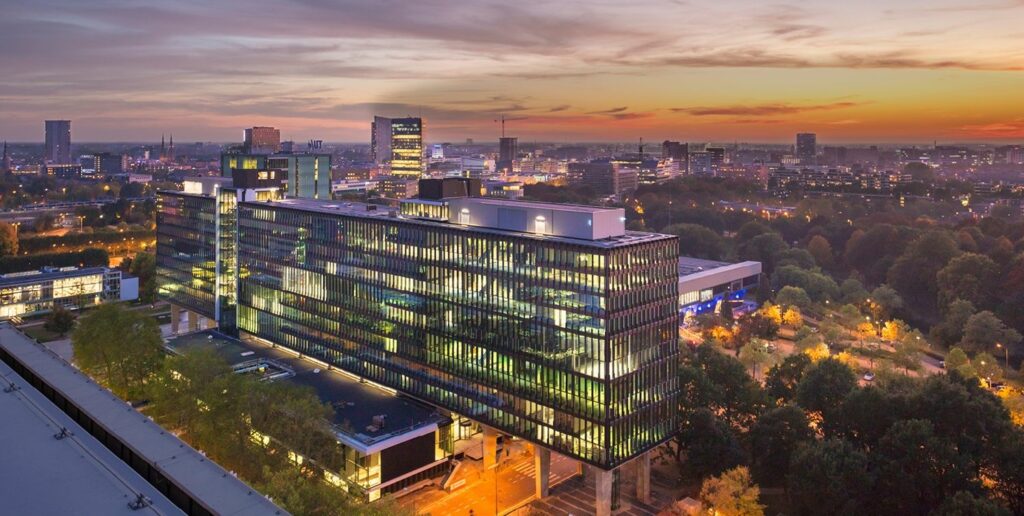
Job description
Are you passionate about quantum technologies and eager to further develop a Rydberg atom quantum computing platform as a 24/7 user-facility for hybrid quantum comping? Join us! We are looking for a candidate that oversees and drives the qubit hardware development and implementation.
Project and Job description
At TU/e, the ultracold atom lab of QT/e, part of the Eindhoven Hendrik Casimir Institute, is constructing a pulse-based Rydberg atom quantum computing platform. This project is part of the KAT-1 Quantum Delta NL program on Rydberg-atom based hybrid quantum computing, which is a demonstrator program based on Quantum Inspire: the European quantum computer that is 24/7 online available for users. In 2024, our qubits will be added and we are looking for quantum engineers/postdocs to make this happen. The selected candidate will play a leading role in the further development of the qubit-platform and its implementation as a user-facility for quantum computation and simulation.
Our platform for hybrid quantum computing and quantum simulation is formed around a quantum co-processor, with qubits based on ultracold atoms. With optical tweezers these atoms are held in a lattice configuration with good controllability and readout. With excitation to Rydberg states, strong nearest-neighbor coupling can be realized, giving rise to multi-qubit entanglement. This platform is very suitable for specific tasks such as hybrid algorithms for quantum chemistry problems. For the Quantum Inspire platform the species of choice is atomic strontium, based on demonstrated high fidelity for single-atom gates. The goal for the QT/e platform is a robust setup to contain strontium atoms reliably in optical tweezers, with excellent single- and multi-qubit control. The setup aims for high stability to make it suitable for 24/7 online access.
Concretely, the selected candidate will guide the progress and development on the qubit-hardware side of this project. The project will specifically focus on the definition of the qubit states, the role of the Rydberg excitation and the nature of the interaction between the atoms, the scheme for multi-qubit entanglement, and the overall suitability for pulse-based and hybrid Variational Quantum Eigensolver problems. Different aspects of the platform will be characterized and optimized, such as improvement of the tweezer lattice filling factor, lower temperature of the atoms, Rabi oscillations for single-qubit operations, Rydberg excitation for multi-qubit gates. The Sr setup is based on a MOT and contains specific optical elements such as two microscope objectives, a spatial light modulator that controls the tweezer array and AODs for atom rearrangement. Additionally, within the ultracold lab, there is a ready to use ultracold rubidium atom testbed, for testing designs and ideas prior to implementation on the Sr computing platform.
The selected candidate will work together with several PhD candidates, fellow postdocs/quantum engineers (other vacancy available, please see V34.6678), MSc students and the PI’s within the ultracold atom team at QT/e. Moreover they will collaborate with the ultracold strontium lab at the UvA in Amsterdam, other partners within the Eindhoven Hendrik Casimir Institute and the wider quantum research network in the Netherlands. The work will be carried out in the Center for Quantum Materials and Technology (QT/e) within the CQT research group.
Job requirements
We welcome applications from candidates with experience in ultracold atoms and/or quantum computing related fields, who have a strong affinity with experimental work. We are especially looking for candidates who take the initiative, work well in a team and know how to manage projects and guide PhD candidates.
Other requirements are:
- PhD in experimental physics, preferably in the AMO field, or a comparable domain.
- Ability to conduct high quality research and technological development.
- Good team spirit, and interest to work in an international environment.
- Good written and oral communication skills in English are a prerequisite.
- Good supervision and collaborative skills.
Conditions of employment
Besides working on a state-of-art quantum computer and developing it into a user-friendly facility in an inspiring and international setting, we offer the following conditions of employment:
- A full-time employment (1.0 fte) for up to 3 years, with a gross monthly salary in the range of € 3.557 and € 5.439 (scale 10–11) based on your degree and previous experience. Besides that, we offer an annual holiday allowance of 8%, an annual end of the year bonus of 8,3%, a total of 41 days of paid holiday. The gross monthly salary and benefits are in accordance with Collective Labour Agreement for Dutch Universities.
- A meaningful job in a dynamic and ambitious university with the possibility to present your work at international conferences.
- Free access to high-quality training programs for research and valorization, and didactical courses of the TEACH training program.
- A broad package of fringe benefits (including an excellent technical infrastructure, moving expenses, and savings schemes).
- Family-friendly initiatives are in place, such as an international spouse program, and excellent on-campus children day care and sports facilities.
- A Staff Immigration Team is available for international candidates, as are a tax compensation scheme (the 30% facility) and a compensation for moving expenses.
Information and application
More information
If you recognize yourself in the profile and would you like to know more then please contact the project leader and scientific director of QT/e Servaas Kokkelmans, s.kokkelmans[at]tue.nl.
Visit our website for more information about the application process or the conditions of employment. You can also contact HR Services, HRServices.Flux[attue.nl.
Please visit www.tue.nl/jobs to find out more about working at TU/e!
Application
Applications can be made through the TU/e vacancies website. We invite you to submit a complete application by using the ‘apply now’-button on this page.
The application should include a:
- Cover letter describing your motivation and qualifications for the position.
- Detailed curriculum vitae, with list of publications, projects and PhD thesis.
- Names and contact information of two references.
We look forward to your application and will screen it as soon as we have received it. Screening will continue until the position has been filled.
.png)
.png)





